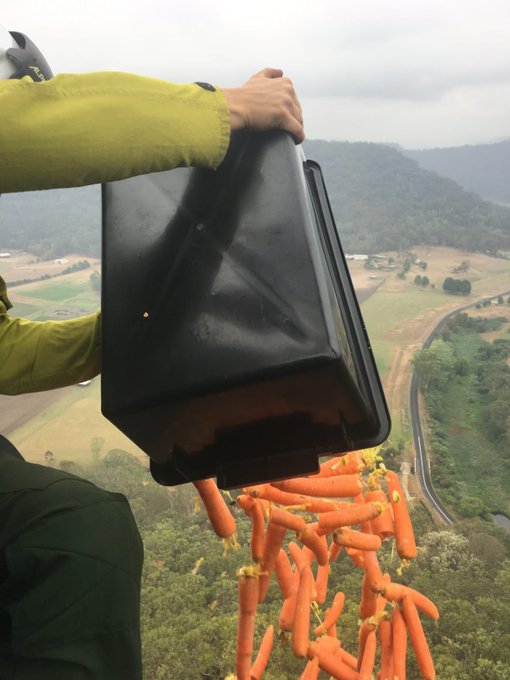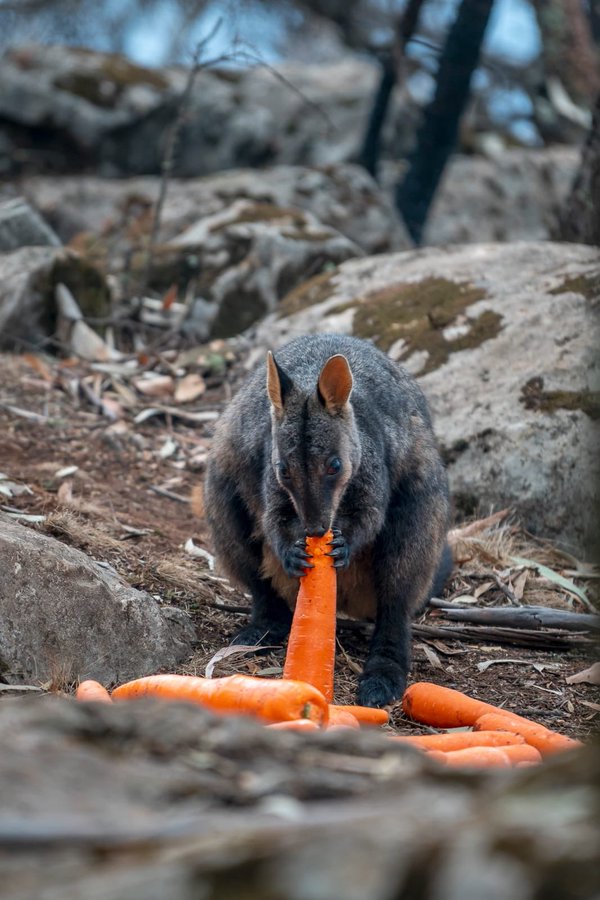Bushfires raging across Australia have left a trail of destruction. Over 2,000 structures have burned and 27 have died, including two volunteer firefighters battling the blazes. More than 18 million acres of land have been swallowed up by flames, leaving few options for defenseless critters caught up in the conflagration.
It's difficult to quantify the destruction, but some experts have suggested that over a billion animals have perished in the bushfires. Those left behind will experience impossible conditions, their food supplies scorched and water supplies tainted by ash.
Buckets of Carrots and Sweet Potatoes
Amid the devastation, one effort, Operation Rock-Wallaby, aims to provide a bit of help to the bushfire's smallest, furriest, and most vulnerable victims. Officials have dropped over 4,000 pounds of vegetables—mainly carrots and sweet potatoes—across key rock-wallaby colonies in New South Wales.
Matt Kean, New South Wales' minister for energy and environment, tweeted about the endeavor on January 11.
"The provision of supplementary food is one of the key strategies we are deploying to promote the survival and recovery of endangered species like the brush-tailed rock-wallaby," Kean said in a statement. "The wallabies typically survive the fire itself, but are then left stranded with limited natural food as the fire takes out the vegetation around their rocky habitat."
Rock-wallabies are a type of marsupial—like kangaroos and koalas—that live in rocky outcrops across Australia's outback. The small, fluffy hoppers graze on native grasses, fruits, and roots. Kean later tweeted that at least one rock-wallaby has been seen munching on food from the drop.
Fortunately, a number of rescue efforts are underway to save the country's prized species. Countless individuals have risked life and limb to save and rehabilitate koalas, kangaroos, and other animals in the fire-stricken regions.
The fires' furious gusts and intense heat have left little opportunity for many animals to escape. Even birds, which seemingly have the best shot at survival, can become overwhelmed in the thick smoke and high winds.
The animals that do escape face months and months of hardship. Diminishing food supplies, threats from opportunistic and invasive predators like cats, and ash-tainted water supplies will make the ecosystem's recovery even more difficult.
Kangaroo Island, a sanctuary for Australian wildlife off the coast of Adelaide, has in recent years been lauded as a conservation success story. Numerous species, like the glossy black cockatoo and the Kangaroo Island dunnart, a tiny and impossibly cute carnivorous marsupial, have been brought back from the brink of extinction.
Now, almost one-third of the island has been engulfed in flames.
Koalas on the island face a particularly dire situation. Kangaroo Island is one of few places in the country where koalas have largely been untouched by chlamydia. The marsupials are particularly susceptible to the communicable bacterial infection, which can cause blindness, infertility, even death.
Therefore, Kangaroo Island populations must be cared for on the charred island instead of being shipped to the mainland for treatment. Now, officials estimate that over half of the koala population on the island has been lost.
In addition to Australia's most charismatic critters, experts mourn the loss of the country's smallest inhabitants: colorful butterflies, arachnids, and other insects. “Invertebrates make up more 95 percent of animal species and the vast majority of animal biomass,” biologist Mike Lee of the South Australian Museum in Adelaide told Science News.
In a country known for housing countless endemic species—found nowhere else on the planet—these numbers aren't just heartbreaking for the country. They're devastating for the entire world.
SEE THE ORIGINAL ARTICLE HERE



